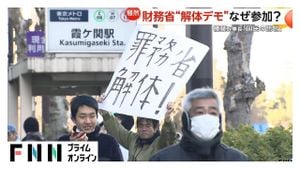The Bank of Korea has made headlines yet again, cutting its benchmark interest rate from 3.0% to 2.75% on February 25, 2025. This decision is seen as part of the country's response to various economic pressures, including slowing growth and rising costs due to U.S. trade tariffs.
Bank of Korea officials convened for their Monetary Policy Committee meeting and made this significant move, marking it as the third cut since October last year. Lee Bok-hyun, Director of the Financial Supervisory Service, emphasized the importance of monitoring the effects of this rate change on household and corporate loans. "We need to closely monitor the effects of the benchmark interest rate cuts on household and corporate loans," he stated, emphasizing the need for careful management during this sensitive time for the South Korean economy.
The backdrop for this decision includes unsatisfactory economic growth projections. The Bank of Korea adjusted its growth forecast to 1.5% down from 1.9% due to factors such as trade tensions and domestic political insecurities. Lee noted, "The benchmark interest has not fully transmitted its benefits to the economy yet, and political uncertainties may restrict policy responses." Such caution reflects the unique challenges the South Korean economy currently faces.
An overarching concern among policymakers and economists is how the recent interest rate cut will influence the real estate market. Analysts predict heightened demand for housing loans particularly around the affluent Gangnam district, where property prices are expected to continue rising. Hence, the interest rate cut may inadvertently intensify market dynamics, potentially favoring sellers.
Lee urged stakeholders to adopt stable management approaches to prevent excessive concentration of household loans, especially as rising expectations around property values coincide with moving season peaks. "The recent recovery trend in some areas of the real estate sector requires careful monitoring to avoid creating loan imbalances," he advised.
The South Korean economy is seeing some signs of stability as the recent volatility of the local currency has somewhat mitigated pressures. The US dollar-to-won exchange rate, which previously skyrocketed due to political uncertainties, faced slight depreciation, reducing some fears about the impacts of the U.S. tariffs on exports.
Experts are watching closely how the stock market reacts to this news. The KOSPI index showed some fluctuations before catching its breath, stabilizing around 2,640 points as investors digest the new rate and its anticipated effects on various sectors. "This rate cut may lead to increased demand for housing loans, especially around the Gangnam area," commented several financial analysts.
Stock market sentiments have been weighed down by trade uncertainties, particularly after specifics of U.S. tariff policies under the new administration came to light. Major companies listed, including SK Hynix and LG Energy Solutions, showed slight downturns amid general market fluctuations.
While there is cautious optimism about the rate cut supporting the economy, many analysts argue significant uncertainties remain. A continual rise in U.S. tariffs and the associated impacts could threaten South Korea's growth momentum, as consumer spending remains fragile.
Lee also highlighted the importance of thorough monitoring of small to medium-sized enterprises as they face substantial risks under the current economic climate. Enhanced supervision to manage potential bad debts effectively was identified as fundamental to sustaining financial health within the sector.
Overall, South Korea's interest rate cut reflects more than just monetary policy; it embodies the current economic pulse. While bolstering household and business finances is the goal, many stakeholders will remain vigilant, closely tracking how these changes translate within broader economic contexts and everyday life.
Given the urgency of improving growth forecasts and addressing uncertainty, the Bank of Korea's actions will undeniably shape the upcoming financial strategies businesses and households will pursue. Stakeholders are advised to prepare for what might lie ahead, fostering adaptability as South Korea navigates these turbulent waters.



